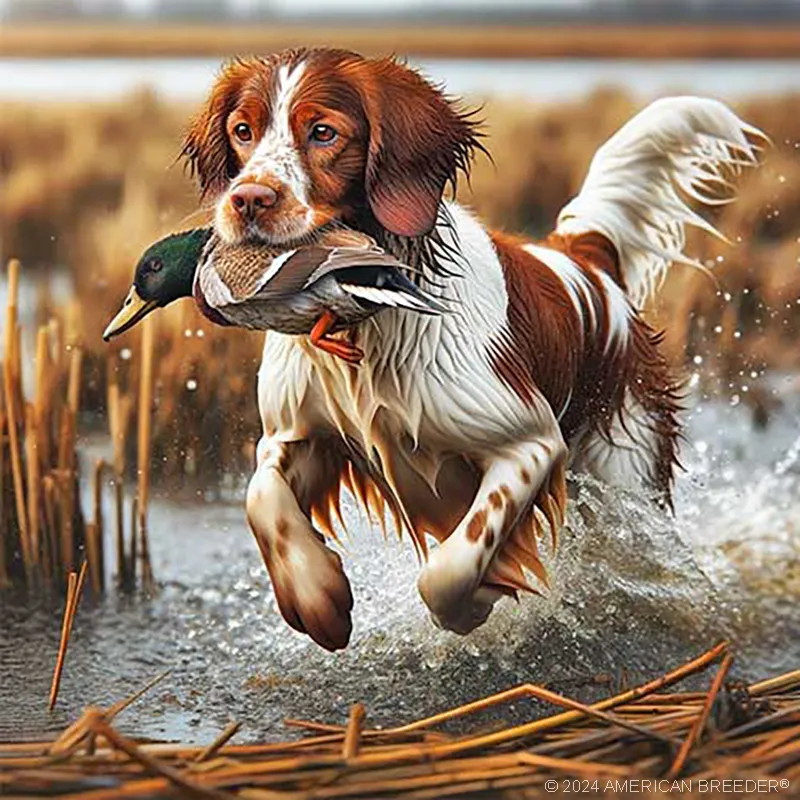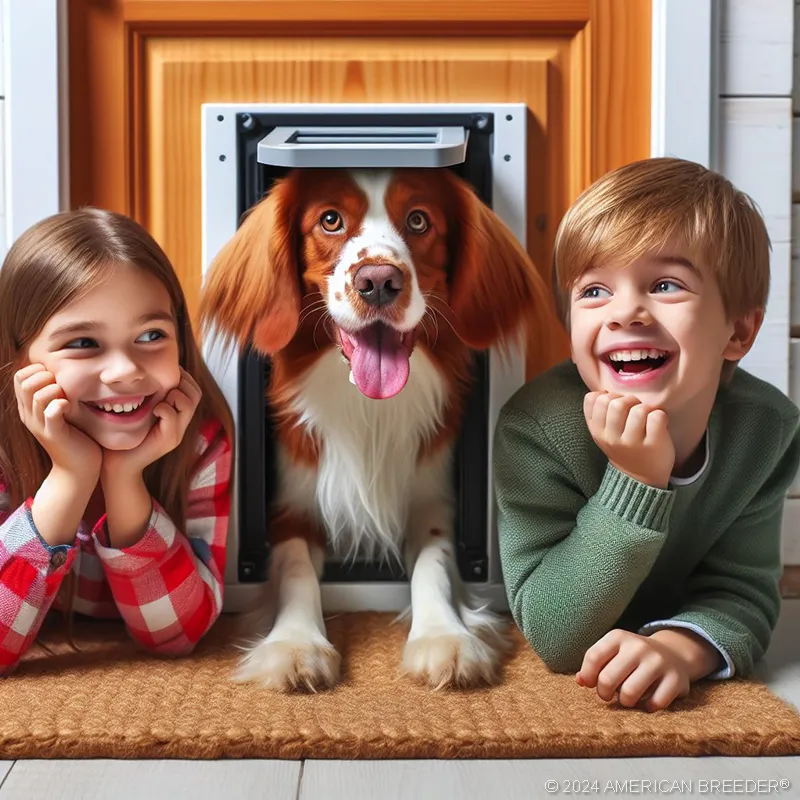From Field to Fireside: The Loving Nature of Brittany Spaniel Dogs
Introduction and Breed Background
 The Brittany Spaniel Dog, also known simply as Brittany or Epagneul Breton, is a delightful and versatile breed with a rich history. This beloved breed originated in France and was primarily developed as a skilled gun dog, excelling in pointing and retrieving game. Today, Brittanys are cherished not only for their exceptional hunting abilities but also for their loving and friendly nature, making them wonderful companions for families and individuals alike.
The Brittany Spaniel Dog, also known simply as Brittany or Epagneul Breton, is a delightful and versatile breed with a rich history. This beloved breed originated in France and was primarily developed as a skilled gun dog, excelling in pointing and retrieving game. Today, Brittanys are cherished not only for their exceptional hunting abilities but also for their loving and friendly nature, making them wonderful companions for families and individuals alike.
Considerations Before Choosing a Brittany Spaniel Dog:
Before bringing a Brittany Spaniel Dog into your home, there are several important factors to consider. Firstly, this breed requires an active lifestyle due to their high energy levels and natural hunting instincts. Families with an active lifestyle or those who enjoy outdoor activities will find an excellent match in a Brittany. Additionally, grooming should be taken into account, as their medium-length coat needs regular brushing to maintain its lustrous appearance. Potential owners should also be prepared to invest time and effort in proper training and socialization to ensure a well-behaved and well-adjusted companion.
Interesting Facts and Fun Facts about the Brittany Spaniel Dog:
Other Names for the Brittany Spaniel Dog: The breed is often referred to as Brittany or Epagneul Breton, with "Epagneul" being French for "spaniel."
Nicknames for the Brittany Spaniel Dog: Affectionately known as "Brits" or "Brittanys" by their owners and enthusiasts.
Breed Background and History:
 The Brittany Spaniel Dog's history can be traced back to the 17th century in the Brittany region of France. It is believed that the breed's development began with crosses between local French spaniels and English Setters or Pointers brought to the region by sailors. This crossbreeding resulted in a breed with exceptional hunting skills and an unmatched ability to locate and point at game birds, making them indispensable for hunters.
The Brittany Spaniel Dog's history can be traced back to the 17th century in the Brittany region of France. It is believed that the breed's development began with crosses between local French spaniels and English Setters or Pointers brought to the region by sailors. This crossbreeding resulted in a breed with exceptional hunting skills and an unmatched ability to locate and point at game birds, making them indispensable for hunters.
With their outstanding performance in the field, the breed gained popularity not only in France but also in other parts of Europe. In the early 20th century, efforts were made to standardize and preserve the breed's unique characteristics, and the first Brittany Spaniel Dog standard was established in 1907.
Today, the Brittany is recognized by major kennel clubs worldwide, including the American Kennel Club (AKC) in 1934, where it is classified under the Sporting Group due to its exceptional hunting abilities and versatility.
Appearance:
Brittany Spaniel Dogs are medium-sized dogs with an athletic and well-balanced build. They typically weigh between 30 to 40 pounds and stand at a height of around 17.5 to 20.5 inches at the shoulder. Their expressive almond-shaped eyes are a distinctive feature, reflecting their intelligence and enthusiasm.
Coat Type, Color Variations, and Patterns:
The Brittany's coat is dense, medium-length, and flat or slightly wavy. It offers protection against harsh weather conditions during hunting expeditions. The breed's coat colors come in various combinations, with the most common being orange and white or liver and white. These color patterns contribute to their striking appearance and ease of visibility in the field.
Distinctive Features or Markings:
The Brittany Spaniel Dog's appearance is marked by its well-proportioned body and gentle expression. They have a slightly rounded skull and a well-defined stop. Their ears are set high and have a triangular shape, often referred to as "hawk-like" ears. Additionally, Brittanys have a naturally docked tail, which adds to their overall athletic appearance. Temperament and Personality:
Temperament and Personality:
One of the most endearing qualities of the Brittany Spaniel Dog is its amiable and affectionate nature. They are known for being gentle, friendly, and loyal companions, forming strong bonds with their families. Their playful and enthusiastic demeanor makes them excellent playmates for children, and they often get along well with other pets in the household.
Energy Levels and Activity Requirements:
Brittanys are high-energy dogs with a strong drive to hunt and explore. They thrive in active environments and require regular physical and mental stimulation to keep them content and well-behaved. Engaging them in outdoor activities, such as long walks, hikes, and play sessions, is essential to meet their exercise needs.
Compatibility with Different Lifestyles and Family Dynamics:
This breed's adaptability and sociable nature make them suitable for a wide range of lifestyles and family structures. Whether living in a bustling family home or as a loyal companion for an individual or couple, Brittanys readily adjust and offer unwavering companionship.
List of Typical Behavior Issues:
Aggression and Biting: Proper socialization and training are crucial to prevent aggressive behavior and ensure a well-mannered Brittany.
Excessive Barking: Brittanys may be prone to excessive barking if not properly trained to curb this behavior.
Digging Behavior: Some Brittanys may exhibit digging tendencies, which can be managed through adequate exercise and mental stimulation. Separation Anxiety: Their strong bond with their owners can lead to separation anxiety if left alone for extended periods. Crate training and gradual departures can help ease this issue.
Separation Anxiety: Their strong bond with their owners can lead to separation anxiety if left alone for extended periods. Crate training and gradual departures can help ease this issue.
Resource Guarding: Early training and positive reinforcement can address resource guarding tendencies in some individuals.
Fear and Phobias: Proper socialization from a young age can help prevent the development of fears and phobias in Brittanys.
Trainability and Intelligence:
Brittany Spaniel Dogs are highly intelligent and eager to please their owners, making them highly trainable. Their natural hunting instincts can be harnessed for various dog sports and activities. Positive reinforcement training methods, such as treats and praises, work exceptionally well with this breed, motivating them to excel in their training endeavors.
Recommended Training Approaches and Techniques
Early and consistent training is vital for Brittanys to establish good behavior and manners. Positive reinforcement training, using rewards and praises for desired behaviors, is particularly effective in shaping their conduct. Socialization with other dogs and different environments during puppyhood helps build confidence and reduces the likelihood of behavioral problems later in life.
Training or Skills Best Suited for Brittany Spaniel Dogs
Brittanys excel in various dog sports and activities due to their high intelligence and versatility. They are particularly well-suited for obedience trials, agility courses, and retrieving competitions. Their natural pointing and hunting abilities also make them excellent companions for bird hunting enthusiasts.
Practical Considerations
To ensure a happy and healthy life for a Brittany Spaniel Dog, several practical considerations should be taken into account. Size of Sleeping Quarters Depending on Size
Size of Sleeping Quarters Depending on Size
The size of a Brittany's sleeping quarters should be spacious enough to accommodate their medium-sized stature comfortably. Providing a soft and cozy bed in a quiet corner of the house allows them to rest undisturbed.
Typical Annual Veterinary Cost
Routine veterinary care, vaccinations, and preventive treatments are essential to maintain a Brittany's well-being. On average, the annual veterinary cost can range from $300 to $600, depending on the dog's health and specific needs.
Type of Grooming and Annual Cost:
Regular grooming is necessary to keep a Brittany's coat in top condition. The annual cost for grooming supplies and professional grooming, if required, may amount to approximately $200 to $400.
Daily Exercise Needs and Requirements:
As active dogs, Brittanys require a considerable amount of daily exercise. Engaging them in regular outdoor activities, such as walks, runs, or playtime in a spacious yard, is essential to meet their exercise needs and prevent boredom.
Level of Playfulness:
Brittany Spaniel Dogs are incredibly playful and lively. They have a natural exuberance that brings joy and entertainment to their families. Their zest for play makes them wonderful companions for active individuals and families with children who can keep up with their energy.
Level of Intelligence:
Brittanys are highly intelligent dogs with an innate ability to learn and problem-solve. Their intelligence, combined with their eagerness to please, makes them quick learners and easily adaptable to training. They thrive when engaged in mentally stimulating activities, and their intelligence allows them to excel in various dog sports and obedience training. Affection Level and Desired Attention:
Affection Level and Desired Attention:
This breed is known for its affectionate and loving nature towards its family members. They form strong bonds with their human companions and enjoy spending quality time with them. Brittanys appreciate attention and thrive on affection, making them true companions and devoted friends.
Friendliness Toward Strangers:
While Brittanys are generally friendly and amicable, they may initially be reserved or cautious around strangers. Early socialization is essential to help them develop confidence and appropriate behavior when meeting new people.
Grooming Needs and Frequency:
The Brittany Spaniel Dog's grooming needs are relatively moderate, but regular care is required to keep their coat in optimal condition. Weekly brushing helps reduce shedding and prevents tangles or mats. Occasional baths can be given as needed, especially after outdoor adventures or when they get particularly dirty. Routine grooming, including nail trimming, ear cleaning, and dental care, is essential for overall health and hygiene.
Feeding Requirements and Dietary Considerations:
A well-balanced diet is crucial to support a Brittany's active lifestyle and overall health. High-quality dog food tailored to their age, size, and activity level is recommended. Portion sizes should be appropriate to prevent overeating and maintain a healthy weight. Always provide fresh water and avoid feeding them human foods that may be harmful to their health.
Health and Care:
 While generally a healthy breed, Brittany Spaniel Dogs can be prone to certain health issues. Common health concerns include hip dysplasia and epilepsy. Responsible breeders conduct health screenings and genetic testing to minimize the risk of hereditary conditions in their breeding lines.
While generally a healthy breed, Brittany Spaniel Dogs can be prone to certain health issues. Common health concerns include hip dysplasia and epilepsy. Responsible breeders conduct health screenings and genetic testing to minimize the risk of hereditary conditions in their breeding lines.
Allergies and Specific Dietary Considerations:
Some Brittanys may develop food allergies or sensitivities, so it's important to monitor their diet and consult a veterinarian if any signs of allergies arise. Switching to hypoallergenic or limited-ingredient diets may be necessary to alleviate potential food-related issues.
Lifespan and Longevity Expectations:
On average, the Brittany Spaniel Dog has a lifespan of 12 to 14 years when provided with proper care, nutrition, and regular veterinary check-ups. A well-maintained and healthy lifestyle can contribute to a long and happy life for this beloved breed.
Exercise Needs and Recommendations for Physical and Mental Stimulation:
Due to their hunting heritage and high energy levels, Brittanys require ample daily exercise and mental stimulation to keep them happy and well-balanced. Engaging in activities that challenge their physical and mental abilities, such as retrieving games, agility courses, or scent work, will help fulfill their natural instincts and prevent boredom.
Nutrition and Feeding Guidelines:
 A well-balanced diet rich in protein and essential nutrients is essential for the overall health and vitality of a Brittany Spaniel Dog. It is crucial to follow the feeding guidelines provided by reputable dog food brands and adjust portion sizes according to the dog's age, size, and activity level. Regular feeding schedules and controlled portions help maintain a healthy weight and prevent overeating.
A well-balanced diet rich in protein and essential nutrients is essential for the overall health and vitality of a Brittany Spaniel Dog. It is crucial to follow the feeding guidelines provided by reputable dog food brands and adjust portion sizes according to the dog's age, size, and activity level. Regular feeding schedules and controlled portions help maintain a healthy weight and prevent overeating.
Vaccination Schedule and Preventive Care:
A proper vaccination schedule is crucial to protect a Brittany Spaniel Dog from common infectious diseases. Core vaccinations, such as rabies, distemper, parvovirus, and canine adenovirus, are essential for their health. Non-core vaccinations may also be recommended based on their lifestyle and potential exposure to specific diseases. Additionally, regular preventive care, such as flea and tick prevention and heartworm medication, is essential to keep them free from parasites and prevent health issues.
Regular Health Check-ups and Vet Visits:
Routine veterinary check-ups are crucial for monitoring a Brittany's overall health and detecting any potential health issues early on. Regular visits to the veterinarian allow for timely vaccinations, dental examinations, and other preventive care measures. During check-ups, the vet can also provide advice on nutrition, exercise, and general well-being.
Signs of Potential Health Problems and When to Seek Veterinary Attention:
As responsible pet owners, it's essential to be attentive to any changes in a Brittany's behavior, appetite, or physical appearance. If they display signs of lethargy, changes in eating habits, lameness, or any other concerning symptoms, it's crucial to seek veterinary attention promptly. Early detection and treatment of health issues can greatly improve their prognosis and quality of life.
Socialization and Compatibility:
Brittany Spaniel Dogs are generally sociable and friendly, making them excellent companions for families, children, and other pets. Early socialization is essential to ensure they grow up to be well-adjusted and confident dogs. Positive interactions with various people, animals, and different environments during their formative weeks will help shape a sociable and well-mannered adult dog. Interaction with Children, Other Pets, and Strangers:
Interaction with Children, Other Pets, and Strangers:
Brittanys are generally good with children, showing patience and affection. However, proper supervision and teaching children how to interact safely with dogs are essential to prevent any unintentional rough play. With proper socialization, they can also get along well with other pets, forming strong bonds with their furry siblings. While they may initially be cautious around strangers, their friendly nature and willingness to interact make them amicable companions once they warm up to new people.
Socialization Needs and Tips for Proper Socialization:
To ensure a Brittany Spaniel Dog develops into a well-rounded and confident adult, socialization should begin from an early age. Exposure to various environments, different sounds, people of all ages, and other animals will help them become more adaptable and less prone to anxiety or fear in new situations. Gradual and positive introductions will foster positive associations and prevent any potential fear or reactivity.
Precautions or Considerations for Multi-Dog Households:
When introducing a new Brittany to a multi-dog household, it's essential to manage the initial interactions carefully. Supervision and gradual introductions in a neutral environment can prevent conflicts and help the dogs establish positive relationships. Each dog's individual needs and personalities should be considered, and professional guidance may be sought if any issues arise.
Level of Ease When It Comes to Training a Brittany Spaniel Dog:
Brittanys are highly trainable and eager to please their owners, making training a relatively smooth process. Positive reinforcement training methods, such as using treats and praises, are particularly effective in motivating them to learn and respond to commands. Consistency, patience, and firm but gentle guidance will yield excellent results in their training.
Playtime and Exercise with Other Dogs or Pets:
Brittanys generally enjoy playing and interacting with other dogs and pets, making them excellent companions for households with multiple animals. Engaging them in playtime with their furry friends can help foster social bonds and provide additional mental and physical stimulation. Dog-Friendly Activities and Outings:
Dog-Friendly Activities and Outings:
This breed thrives in outdoor activities and adventures. Taking them on regular walks, hikes, and trips to dog-friendly parks or beaches will keep them happy and content. They also enjoy participating in dog sports and activities, such as agility, flyball, and obedience trials.
Living Arrangements and Environment:
The Brittany Spaniel Dog's adaptability and versatile nature make them suitable for various living arrangements and environments. However, they are best suited for homes with access to outdoor spaces, such as a yard or a nearby park, where they can burn off their excess energy through play and exercise.
Suitability for Different Living Arrangements:
While Brittanys can adapt to different living arrangements, they are not well-suited for apartment living due to their active nature and exercise needs. They thrive in homes with ample space for them to roam and explore. A house with a fenced yard provides an ideal environment for them to play safely.
Space Requirements and Exercise Options:
Brittanys require sufficient space to stretch their legs and engage in physical activities. A medium to large-sized yard is ideal for them to run, play fetch, and indulge in their natural hunting instincts. Regular outdoor exercise is essential to keep them mentally stimulated and prevent undesirable behaviors stemming from boredom.
Climate Considerations and Adaptability:
The breed's adaptability allows them to tolerate various climates, but they are more comfortable in moderate weather conditions. Extreme heat or cold may pose some challenges for them, so proper precautions, such as providing shade and water during hot days or ensuring warmth during colder weather, are necessary to keep them comfortable.
Recommended Yard Size for a Brittany Spaniel Dog:
While Brittanys can adapt to different yard sizes, a medium to large yard is recommended to allow them sufficient space for play and exercise. A fenced yard also provides a secure area for them to roam freely, minimizing the risk of wandering off or encountering potential hazards.
Ideal Living Conditions and Environment:
The ideal living conditions for a Brittany Spaniel Dog involve an environment that encourages active play, exercise, and mental stimulation. A loving and attentive family who can devote time to meet their social and physical needs is essential. Whether living in the countryside or the suburbs, they thrive in homes with access to outdoor spaces and opportunities for adventurous outings.
Training and Obedience:
Brittany Spaniel Dogs possess a remarkable ability to learn and excel in obedience training. Their willingness to please their owners and their intelligence make them eager learners. Basic obedience training is vital to establish boundaries and reinforce good behavior, while advanced training can unlock their potential in various dog sports and specialized activities. Basic Obedience Training and Commands:
Basic Obedience Training and Commands:
Basic obedience training lays the foundation for a well-mannered and obedient Brittany. Commands such as sit, stay, come, and heel are essential for their safety and control in different situations. Consistency and positive reinforcement are key in reinforcing these commands and ensuring they respond promptly.
Advanced Training or Specialized Activities Suited for Brittany Spaniel Dogs:
Brittanys excel in various advanced training activities and specialized roles. They are natural retrievers, making them ideal candidates for field trials and hunting competitions. Their athleticism and agility make them well-suited for agility courses and flyball. Additionally, their keen sense of smell and problem-solving abilities allow them to thrive in scent detection and search and rescue training.
Behavioral Challenges or Specific Training Considerations:
While Brittanys are highly trainable, some may exhibit behavioral challenges that require patience and consistent training. Addressing potential issues such as separation anxiety, resource guarding, or excessive barking should be done with positive reinforcement and professional guidance if needed. Early socialization and consistent training can prevent or alleviate these challenges.
House Training and Potty Training Tips:
House training and potty training should start early with a consistent routine. Establish a designated bathroom area outside and take your Brittany there at regular intervals, especially after meals and playtime. Use positive reinforcement, such as praises and treats, when they eliminate in the appropriate spot to reinforce good habits.
Leash Training and Walking Etiquette:
Leash training is essential to ensure that a Brittany walks calmly and politely on a leash. Start leash training from a young age, and use positive reinforcement to reward good walking behavior. Teaching them to walk beside you without pulling and respond to commands such as "heel" enhances their walking etiquette and ensures enjoyable walks together.
Exercise and Activity:
Regular exercise is paramount for a Brittany Spaniel Dog to maintain good physical health and mental well-being. Engaging them in daily exercise and activities that stimulate their minds helps prevent boredom and undesirable behaviors that may result from pent-up energy.
Daily Exercise Needs and Recommendations:
Brittanys have high energy levels and require at least one to two hours of exercise daily. Engaging them in activities that mimic their natural hunting instincts, such as fetch, tracking, or scent work, allows them to channel their energy productively. Regular walks and runs are also essential for their overall well-being.
Mental Stimulation Activities and Games:
Mental enrichment is equally important for Brittanys to keep their sharp minds engaged. Interactive toys, puzzle feeders, and hide-and-seek games are excellent ways to stimulate their problem-solving abilities and prevent boredom. Training sessions that challenge their intelligence also provide mental stimulation and strengthen the bond between the dog and its owner.
Exercise Routines and Activity Ideas:
Creating a varied exercise routine keeps things interesting for a Brittany Spaniel Dog. Combining outdoor activities like hiking, swimming, and off-leash play in a dog park with mental stimulation games inside the home ensures they lead fulfilling and happy lives. Engaging in new activities and introducing different challenges also keeps them mentally sharp and physically fit.
Energy Outlets for High-Energy Breeds:
Brittanys thrive on physical and mental challenges, making it essential to provide various energy outlets for them. Participating in dog sports, agility training, or even engaging in scent detection games can help channel their high energy levels into productive and enjoyable activities. Regular play sessions and interactions with their family members also contribute to meeting their energy needs and strengthening the bond between the dog and its human companions.
Financial Planning:
Owning a Brittany Spaniel Dog comes with certain financial responsibilities to ensure their well-being and happiness. Budgeting for their care and expenses is essential to provide them with the best possible life.
Typical Price Range for Purchasing a Brittany Spaniel Dog from Reputable Breeders:
The cost of purchasing a Brittany Spaniel Dog from reputable breeders can range from $800 to $2000, depending on factors such as the breeder's reputation, the dog's pedigree, and its lineage.
Initial Costs (Adoption Fees or Purchase Price, Vaccinations, Spaying/Neutering, Microchipping):
In addition to the purchase price or adoption fees, initial costs include essential vaccinations, spaying or neutering procedures, and microchipping. These initial expenses can range from $200 to $500, depending on the veterinarian and location.
Ongoing Expenses (Food, Grooming, Veterinary Care, Training, Toys, and Supplies):
The ongoing expenses for a Brittany Spaniel Dog may vary depending on factors such as the dog's size, age, and health condition. On average, monthly costs for food, grooming, and toys can range from $50 to $100. Regular veterinary care, including annual check-ups and vaccinations, may cost around $500 per year. Training and supplies for toys, collars, and leashes may incur additional costs.
Considerations for Pet Insurance or Budgeting for Unexpected Medical Costs:
Pet insurance is an option for owners who want to be financially prepared for unexpected medical expenses. Having pet insurance can help mitigate the cost of emergency veterinary care and unexpected illnesses or injuries. Alternatively, setting aside an emergency fund specifically for the dog's medical needs can also provide financial security in case of unexpected health issues.
Options for Pet Care During Vacations or Travel:
Planning for pet care during vacations or travel is essential for Brittany owners. Options include hiring a professional pet sitter, boarding the dog in a reputable kennel or pet hotel, or arranging for a trusted friend or family member to care for the dog in their absence. Ensuring that the dog is comfortable and well-cared for during the owner's absence is crucial for their well-being and peace of mind.
Overall Summary:
In summary, the Brittany Spaniel Dog is a versatile and energetic breed with a rich history as a skilled hunting companion. They are medium-sized dogs with a friendly and affectionate nature, making them excellent family pets. Their intelligence and eagerness to please make them highly trainable, while their active lifestyle requires regular exercise and mental stimulation.
Responsible ownership involves choosing reputable breeders or adopting from shelters, providing proper training and socialization, and ensuring their health and well-being through regular veterinary care. Owners should be aware of legal responsibilities, such as licensing and compliance with local regulations.
Conclusion:
If you're considering welcoming a Brittany Spaniel Dog into your life, remember that they are wonderful and loving companions that thrive in an active and engaging environment. They will reward you with boundless loyalty and affection. Responsible ownership entails dedicating time, attention, and resources to meet their physical and emotional needs. Whether you're exploring the breed's history or seeking advice on training and care, there are ample resources available to support you in providing the best life possible for your Brittany Spaniel Dog.
Embrace the journey of dog ownership with enthusiasm, love, and a commitment to providing a loving, suitable home for your beloved Brittany Spaniel Dog. With the right care and attention, they will undoubtedly become a cherished and indispensable member of your family, filling your life with joy, adventure, and unconditional love. So, embark on this fulfilling journey, and you'll discover the immense joy and companionship that comes with having a Brittany Spaniel Dog by your side.
Brittany Spaniel Dog Quick Reference Guide
Breed Background: Origin: France | Breed Purpose: Versatile Gun Dog | AKC Class: Sporting Group | Year Recognized by AKC: 1934
 Appearance: Size: Medium | Weight: 30-40 pounds | Coat Type: Dense, Medium Length | Colors & Patterns: Orange & White, Liver & White | Distinctive Features: Energetic, Athletic Build
Appearance: Size: Medium | Weight: 30-40 pounds | Coat Type: Dense, Medium Length | Colors & Patterns: Orange & White, Liver & White | Distinctive Features: Energetic, Athletic Build
Temperament: Energy Level: 4 | Friendliness to Pets: 4 | Friendliness to Strangers: 3 | Trainability: 5 | Playfulness: 4 | Frequent Barker: 2 | Chase Instincts: 4 | Sense of Smell: 5 | Drive to Hunt: 5
Health & Care: Health Issues: Hip Dysplasia, Epilepsy | Lifespan: 12-14 years | Grooming Difficulty: Moderate | Exercise Needs: High
Socialization: Interaction with Children: Good, Playful | Interaction with Pets: Usually Friendly | Interaction with Strangers: Reserved but Polite | Ease of Training: Highly Trainable
Suitable Living Arrangements: Apartment: No | House: Yes | Rural Area: Preferable | Yard Size Requirements: Medium to Large Yard
Training & Obedience: Trainability: 4 (Easy) | Intelligence: 4 (High) | Obedience: 3 (Moderate) | Problem-Solving: 4 (Advanced) | Easily Stimulated: 4 (High) | Focus Level: 3 (Moderate) | Easily Distracted: 2 (Low)
Financial Planning: Typical Price Range: $800 - $1,500 | Initial Expenses: Vaccinations, Bed, Crate | Ongoing Annual Expenses: Food, Vet Visits
Breeding: Reproductive Maturity: 12-18 months | Litter Frequency: 1-2 per year | Litter Size: 6-8 puppies | Stud Cost: $500 - $1,000 | Breeding Challenges: Proper Genetic Testing Required
Did You Enjoy this Article? Share it and Help Us Spread the Word!
If you found this article helpful, we'd appreciate it if you could share it with your friends or link to it from your website, blog, or group! You can also use the convenient social share tabs on the left side of the screen to instantly share this page to your social media feed. For more ways to support and promote the American Breeder Community, visit our Share & Promote Together page for social media posts and memes you can copy and share. Your support means the world to us!
Disclaimer: The information provided in this article is for general informational purposes only and does not constitute legal, medical, financial, or professional advice. While we strive for accuracy, we make no representations or warranties regarding the completeness, accuracy, reliability, or suitability of the information. Please consult with a professional before making decisions based on the content provided. American Breeder Inc. assumes no responsibility for any errors or omissions or for the results obtained from the use of this information.
